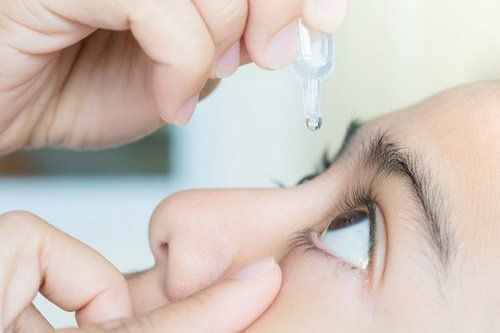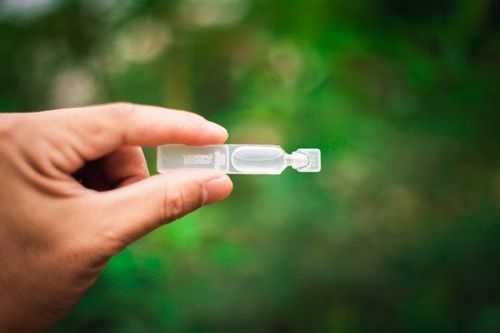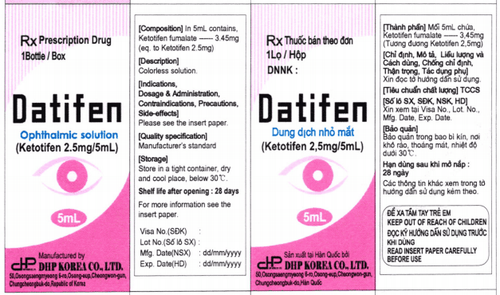This is an automatically translated article.
Alrex is an eye drops used in the treatment of eye diseases. Alrex belongs to the group of corticosteroids or steroids (cortisone-like drugs), containing the main ingredient loteprednol etabonate. Alrex is prepared in the form of a 2% suspension for eye drops.
1. What are the uses of Alrex?
The Loteprednol component of Alrex is used to treat eye pain, redness, and swelling caused by certain eye diseases or eye surgery. This medication is also used to treat itchy eyes caused by a condition called seasonal allergic conjunctivitis. Loteprednol is also used to treat the symptoms of dry eye disease. Alrex should only be taken with a doctor's prescription.2. Dosage and how to use Alrex
2.1. How to use the medicine Wash your hands with soap and water before and after using the medicine. Turn the closed bottle upside down and shake for 1 to 2 seconds before instilling the medication in the eye. Tilt your head back and gently press your finger against the skin just below the lower eyelid, then pull the lower eyelid away from the eye to create space. Drop the medication into this eye space. Release your eyelids and gently close your eyes, without blinking, and use your fingers to press the inner corner of the eye for 1 or 2 minutes to allow the medicine to penetrate the eye. To keep the medication as sterile as possible, do not touch the tip of the medication to any surface (including the eyes), keep the container tightly closed. This is very important because if the eye drops are contaminated, they will damage the eyes. Wait at least 5 minutes after using Alrex eye drops before you use other eye medications. 2.2. Dosage The dose of Alrex is different for different patients. The following is the average dose of Alrex:
Adults: Instill one to two drops in the eye to be treated, 4 times a day for up to 2 weeks. Children: The use and dosage of the drug must be prescribed by a doctor. In case of eye pain or inflammation after eye surgery:
Adults: Put one to two drops in the eye to be treated, 2 times a day, beginning 24 hours after surgery and for 2 weeks thereafter. Children: The use and dosage of the drug must be prescribed by a doctor. Seasonal allergic conjunctivitis:
Adults: Instill one drop of 0.2% ophthalmic suspension in the affected eye 4 times a day. Children: The use and dosage of the drug must be prescribed by a doctor. If you miss a dose of Alrex, apply it as soon as possible. However, if it is almost time for your next dose, skip the missed dose and take it at your usual schedule.
3. Before using Alrex, what should be noted?
Inform your treating doctor of any unusual or allergic reaction to Alrex or any other medicine. If you have any other type of allergy, such as to foods, dyes, preservatives or animals, you need to tell your doctor before taking the medicine. Safety and effectiveness of Alrex in children have not been established Elderly: There have been no reports that Alrex may have limited effects in the elderly. Loteprednol eye drops are not for long-term use. Steroid eye drops can cause glaucoma (increased pressure inside the eye) or posterior subcapsular cataracts (a rare type of cataract) if used for too long. Slow healing may also occur while you are using this medicine after cataract surgery. Use caution when using contact lenses while taking Alrex. If you have eye damage or an eye infection, tell your doctor right away. You may have to change your medication or stop using it.
4. Alrex drug interactions
Should not use Alrex with Desmopressin Alrex should not be used with the following drugs: Bemiparin, Lutetium Lu 177, Dotatate, Macimorelin, Nadroparin, Sargramostim However, if necessary, it can still be combined when prescribed by a doctor. . Using Alrex with Auranofin may increase your risk of certain side effects. However, if both medicines are prescribed together, your doctor may change the dose or frequency of using one or both medicines. Medicines can be affected by certain foods, alcohol or tobacco.
5. Undesirable effects when using Alrex eye drops
See a doctor immediately if any of the following side effects occur:
Common: Blurred vision or other vision changes, eye redness or swelling, increased sensitivity to light, swelling of membranes covering the white part of the eye Uncommon: Reduced vision discharge from the eye discomfort, irritation or pain in the eye, redness of the eyelid or inner lining of the eyelid, small bumps on the inner lining of the eyelid . Unspecified incidence: Blindness, fading or loss of vision, nausea and vomiting, slow wound healing. A number of other undesirable effects may occur that usually do not require medical intervention. These side effects may go away during treatment as your body adapts to the medicine. In addition, your treating doctor can tell you about ways to prevent or reduce some of these side effects.
Please dial HOTLINE for more information or register for an appointment HERE. Download MyVinmec app to make appointments faster and to manage your bookings easily.













